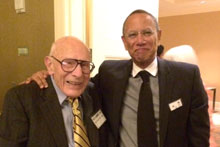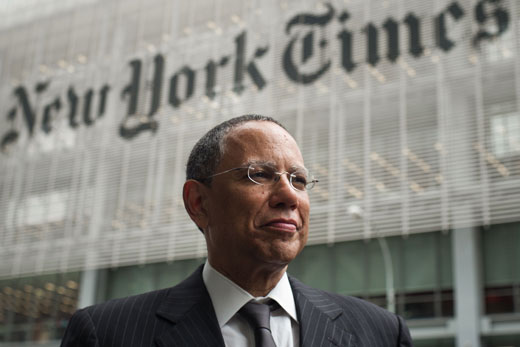The tables were turned for New York Times Executive Editor Dean Baquet last week, when the award-winning investigative journalist took the hot seat, fielding questions from more than 75 Emory University and Morehouse College students on topics ranging from the impact of the digital age on daily newspapers to racial issues in the newsroom.

New York Times Executive Editor Dean Baquet (right) gave the introduction Nov. 7 as Emory graduate and Pulitzer Prize winner Claude Sitton (left) was inducted into the Atlanta Press Club Hall of Fame. Photo by Hank Klibanoff.
Baquet was in Atlanta to help honor Emory graduate Claude Sitton, a Pulitzer Prize-winning newspaper reporter and editor who was sent South by the New York Times to cover the civil rights movement during the 1950s and 1960s, eventually becoming the newspaper's national editor.
Sitton, now a resident of Emory's Wesley Woods community, was inducted into the Atlanta Press Club Hall of Fame during a ceremony Nov. 7. He graduated from Emory in 1949, where he served as editor in chief of the Emory Wheel. Sitton returned to Emory to teach from 1991 to 1994, served as a member of the Board of Counselors of Emory's Oxford College from 1993 to 2001, and was instrumental in establishing Emory's journalism program in the mid-1990s.
James M. Cox Professor of Journalism Hank Klibanoff, who wrote about Sitton in his Pulitzer-Prize winning history of civil rights journalism, "The Race Beat," had invited Baquet to introduce the award-winning journalist during his Hall of Fame induction, and also asked if he would come to Emory to meet with journalism students.
"He jumped quickly at both," Klibanoff said.
Born and raised in New Orleans, Baquet acknowledged that he had stumbled into journalism accidentally. After attending Columbia University to study English, he became homesick following his sophomore year. Returning to New Orleans, he took a summer newspaper internship, where he "just thought it was the most fun I'd ever had from the first day."
"It was a great adrenaline rush," he said. "You get to see a part of the world that you never get to see — in my case to see neighbors in New Orleans that I'd never seen … Also to feel like, and I think this is still what drives me, you had a real impact on the world, (that) you can write a story to change things."
Though he didn't finish his college degree — "I don't recommend this route," he cautioned — Baquet would go on to report for the States-Item and Times-Picayune of New Orleans, the Chicago Tribune, and the New York Times, where he would become an editor. Baquet was hired by the Los Angeles Times as an editor and managing editor before rejoining the New York Times, where he held positions as Washington bureau chief, national editor, assistant managing editor and managing editor.
This May he succeeded Jill Abramson to become the first African American to serve as the New York Times' executive editor, the newsroom's highest-ranking position.
Here are highlights from the session:
In what ways do you see the NYT evolving?
The Times has already changed – all newspapers have changed. I use video as an example. Video used to be this thing that was off to the side ... Actually with the Ebola story, there was one moment when we published a video profile — a 10 minute mini-documentary — a portrait of ambulance driver in Monrovia, Liberia, going from place to place, picking up bodies, picking up patients. I watched that video and came into the newsroom the next morning and sat down at our Page One meeting … and said this is the first time I could actually say that video is now part of what we do. That was the moment I couldn't imagine our coverage without video.
What do the changes mean for investigative reporting?
Investigative reporting done right, done aggressively and done big is going to be one of the most important things going forward, especially for big news organizations … The thing I've put the most energy into in the last five month as executive editor is building up our investigative reporting capability. (Here Baquet mentions a recent NYT investigative series examining people who've become rich under Vladimir Putin.) As more and more news organizations shrink, there are … not many organizations big enough to do that kind of big, big investigative reporting.
Since 9/11, has the federal government become more or less open to providing information to the media?
America now conducts war mostly in secret. That's big. It used to be in times of war, lots of people knew soldiers; there were lots of reporters out there. But now much of American warfare is conducted with drones, which is secret. The whole universe of special operations has grown dramatically; that's secret. It is stunning, if you think about it, that the US is involved in probably five places in a significant way — if you count Afghanistan, Iraq, Syria, Yemen, parts of Africa — in a profound way, without American's knowing a lot of detail about it. I think that's a big impact on society … The other dramatic change is that it used to be an unspoken fact that in warfare everybody just left journalists alone. That's just not true anymore.
How do you balance going after stories that the country needs to know versus stories that will get the most clicks?
For the most part, the stories that the country needs to know get a lot of clicks. The mid-term elections? We had more traffic on our website, I mean it was just off the charts. Presidential elections? Off the charts. Big investigative stories with edge? Off the chart. … If I decided to get into the business of competing on coverage of the rawest popular culture, nobody's coming to us for that anyway, so I don't feel pressure to do that. I don't mind the fact that I now know what people want to read, because I don't think that's an unhealthy thing to know.
Should a journalist be politically correct?
Politically correct is one of those phrases that I think have been rendered into meaninglessness. I'll answer a different way: A journalist has tremendous power, outsized power, power bigger than your weight, which means you should be sensitive in how you use it… Mainly I think a journalist should tell the truth. Big, big players, governments, big corporations, big institutions that have power? Then you are punching at your own weight. You should be more sensitive when you're not punching at your own weight.
Any advice to minority students when dealing with race in the newsroom?
Newsrooms are like society, they're no different than any other institution. They are capable of great understanding but also capable of great ignorance. I think you have to go into every institution understanding and knowing that, which means you should stand your ground but not be overly sensitive… I don't think it's any different than the only non-journalism job I had, which was working in a department store.
What's your assessment of the job market for young journalists?
I think the job market is actually quite good. The definition of what a journalist is (today) is a lot broader than what it was when I started out. I now sit down with people in my newsroom who are technologists who work for me, who are computer scientists who work for me, the guy who runs our graphics operation… it's now a world of storytelling through visuals. As long as you know that there are different kinds of jobs that require different kinds of skills…
What advice do you have for an aspiring print journalist?
You should not consider yourself an aspiring "print journalist" … I hope print never goes away, but I think if you define yourself that way you're making a mistake… Lose that print part of the definition. The best journalists I know who are still reporting adapted to change.

